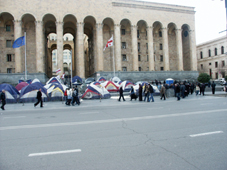Hunger strikes end
By Eter Tsotniashvili and Winston Featherly
Wednesday, March 26


After a second exhortation from the country’s spiritual leader, opposition politicians called off their hunger strike without having won any visible concessions from the government.
“We ended the hunger strike but we continue our struggle,” said Koba Davitashvili, a leading member of the eight-party opposition coalition which began the hunger strikes, as he announced the decision to supporters outside parliament. Some, wanting to continue the protest, shouted down the opposition leaders.
Opposition leaders say they are now ready to campaign for the May 21 parliamentary election, with rhetoric no less confrontational than during the hunger strike.
“We cannot go against the Patriarch, as we cannot do anything at all without his blessing,” said Goga Khaindrava, another coalition leader. “But if the May 21 election is rigged, there will be a revolution.”
Earlier in the day, Catholicos-Patriarch of All Georgia Ilia II, for the second time in a week, asked the hunger strikers to go home.
“Thinking categorically is very dangerous for ordinary people as well as for the government,” he said in front of parliament, where he took sanctified water and communion bread to the hunger strikers, which they ate. “I want to ask once more to end the hunger strike and find some other measures.”
He admonished them for hunger striking during Lent, calling the act “un-Christian.”
After the opposition decided to end the demonstration outside parliament, where campaigners had blocked off a portion of Rustaveli Avenue, Speaker of Parliament Nino Burjanadze said the government is willing to continue talks with the opposition.
“I call on all opponents to come back to the negotiating table and reach an agreement on continuing to move toward NATO, toward uniting the country and toward the development of Georgia’s democracy,” Burjanadze said in a live televised speech.
She promised that every vote will count in the parliamentary elections, and thanked the Patriarch for his role defusing the situation outside parliament.
Opposition politicians were unavailable for comment yesterday. The decision to end the hunger strikes seemed to come suddenly, after deliberations within the sometimes-fractious coalition.
Before the decision was made, President Saakashvili accused some in the opposition of sabotaging compromise with the government.
“I have done just about everything,” Saakashvili said from the province of Kakheti, in his first public comments on the hunger strike since returning from a trip to Washington. “We reached some agreements, but for some reason—maybe their lack of consensus, indecision or a wish to strain the situation—many of my proposals were refused.”
“What I see is a radical portion of the opposition trying to thwart the elections,” he said.
Saying he was “troubled” by the hunger strike, Saakashvili promised fair elections. “Nothing will block the will of the Georgian people,” he said, in reference to a January 5 plebiscite calling for spring parliamentary elections, vowing to hold the elections regardless of circumstance.
The opposition’s hunger strike began on March 9 with scores of opposition campaigners pitching tents outside parliament. Demands ran from free and fair elections to reforming the system for electing parliamentarians, which opposition politicians say is stacked against them. Roughly a dozen hunger strikers had to be hospitalized, including Conservative MP Zviad Dzidziguri.
